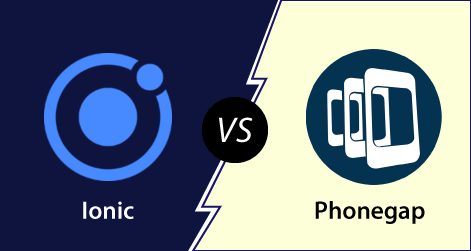Difference between Ionic and PhonegapIonic and Phonegap are a widely adopted framework used to develop mobile apps. Both frameworks have a large community of passionate developers and are used in large enterprises. In this section, we are going to see how Ionic is different from Phonegap. PhonegapPhonegap is an open-source framework that is widely adopted for developing cross-platform mobile apps. It allows developers to create an application by using web technologies such as HTML, CSS, and JavaScript. It builds an app for all popular platforms such as iOS, Android, Blackberry, and Windows OS. It is developed and maintained by Adobe Systems. Phonegap is the best framework if you want to create a simple mobile web application with the touch of a native app. We can develop one application using the Phonegap framework and deploy it on multiple platforms without rewriting the code again. Initially, Phonegap was introduced around 2009 by Nitobi software and named it Apache Cordova. In 2011, Adobe systems purchased Nitobi software and renamed the Apache Cordova as Phonegap. Advantages of Phonegap The advantages of the Phonegap application are as follows: Open-Source: Phonegap is open-source, which provides most of its functionality free. Cross-Platform: Phonegap is a reliable cross-platform that allows the developers to write only one code and executes on various platforms such as iOS, Blackberry, Android, and WebOS. Ease of Development: Phonegap works on web technologies like HTML, CSS, and JavaScript that supports all browsers. It makes the app development easy. Flexibility: It provides great flexibility to the developers for developing any type of mobile app without any serious efforts. There is no need to learn additional languages other than HTML, CSS, and JavaScript. Libraries: It has a variety of libraries, which helps to enhance the platform's functionality. Strong and Robust Backed: Phonegap has a robust backend system that reduces the developer's efforts and speeds up the development process.Disadvantages of Phonegap The disadvantages of Phonegap application are as follows: Performance: The performance of the Phonegap application is slow because it contains lots of graphics elements in the mobile app. Lack of clear information: In terms of coding, the proper guideline is not mentioned. Thus, programming an app of the superb interface has become tedious for the developer. Poor Documentation: The documentation of Phonegap is not much descriptive. Therefore it is very difficult for a programmer to use this platform effectively. IonicIonic is an open-source UI toolkit for building high-quality Mobile apps, desktop apps, and progressive web apps. It uses web technologies such as HTML, CSS, and JavaScript to create high-quality cross-platform apps. It allows developers to build once and run everywhere. It was created by Max Lynch, Ben Sperry, and Adam Bradley and developed by Drifty Co. in 2013. The first version of the Ionic framework introduced in March 2014. The Ionic framework mainly focuses on front-end user experience or UI interaction, which handles all the look and feel of your app. It is easy to learn and can integrate with other libraries or frameworks such as Angular, React, Cordova, etc. Officially, the Ionic framework has integration with Angular, but it also provides support for Vue.js and React.js. Advantages of Ionic The advantages of the Ionic application are as follows: 1. Easy to learn If the developer has a basic knowledge of CSS, HTML, or JavaScript frameworks, then learning and developing apps using the Ionic framework is very easy. 2. Easy documentation Ionic provides simple, easy, and well-structured documentation. The official documentation covered most of the things required for the developers. 3. Cross-platform The ionic application can deploy on multiple platforms such as iOS, Android, Desktop, and the web, all with one codebase. The ionic applications can write once and runs everywhere. 4. User Interface The user interface of Ionic, such as themes and components are highly customizable. The ionic platform allows its components to adapt to the platform on which the application is running. Disadvantages of Ionic The disadvantages of Ionic application are as follows: 1. Performance The performance of the Ionic application is not as good as compared to native mobile applications. However, the performance gap is not noticeable for most of the average users. 2. Security The app developed with the Ionic framework may not provide as much security as a native application. For example, if you are developing a financial app, e.g., the app for a bank, the Ionic framework is not recommended. 3. Limited native functionality Some native functions may not be available in the Ionic framework. In such a case, you need to develop the plugin to fulfill that function yourself. However, there are many plugins available to cover most of the native functionalities. 4. Not good for video game Ionic framework is not perfect for high-end graphics-dependent applications or video games. 5. Early adopter risk Ionic technology is still in development. It regularly keeps changing its support and standard, and its libraries can be completely rewritten at any time. Ionic vs. Phonegap
Next TopicIonic vs Xamarin |